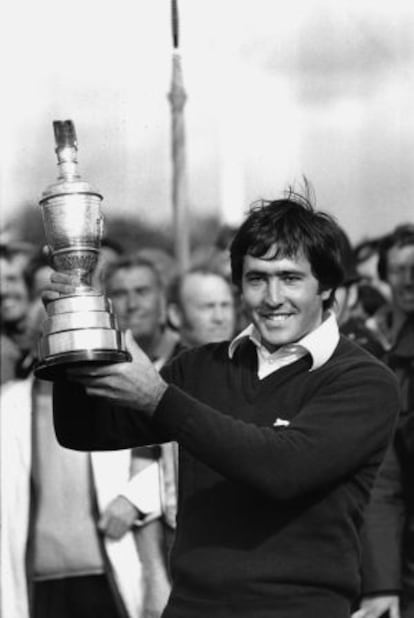Seve was the fifth Beatle
The Spanish golfer, who died a year ago this week, changed the face of his sport

When I was young I had two idols, Muhammad Ali and Severiano Ballesteros, without realizing at the time that both had something in common; they changed the face of their respective sports forever.
In boxing, there were some gentlemen hitting each other. Ali arrived and turned the sport into art with his punches and his dances. He created his own interpretation of boxing. The same thing happened with Ballesteros. Golf was a sport invented at Saint Andrews, Scotland, in the 15th century that would be banned until 1620 and substituted by archery and fencing. Golf was a sedentary sport played by middle-aged men with a questionable taste in attire: checkered trousers and garish shirts. Then came Ballesteros, a young Latino, the Latin lover, with his exaggerated ways and a manner of striking the ball from left to right that changed everything.
He exploded onto the scene at the British Open in 1976. He was 19 years old and finished second behind American Johnny Miller. I went to watch him at the Royal Birkdale club, near Liverpool and near my house. It was my birthday on July 12 and my father paid for me to attend four days of the championship and another of practice. I was following Jack Nicklaus and had struck up a certain friendship with him as I trailed behind him across the course until suddenly I heard a murmur: “Seve Ballesteros, Seve Ballesteros…!”
Seve was behind a bunker on the 14th and I ran over (I was then a young man and quite athletic). And there he was, walking up and down the bunker, with his trousers rolled up to his knees, just the way he liked to wear them. The ball was 120 meters from the green with an Irish Sea breeze lashing the course. He selected a five iron and did not aim for the green but shot into the wind. The ball faded and faded and I couldn’t see it but I heard a shout of excitement that suggested it had landed very close to the flag. That was magic. Golf would never be the same for this young Englishman, nor for anybody else.
Three years later Seve won the British Open at Royal Lytham. On the 16th, he hit his ball into a car park (not the course’s, but a different one, as Seve always liked to remind people). Around 15 minutes later and after a few cars had been moved, he struck the ball over the grandstand, made par and won the Open. In 1980 Ballesteros became the first European to win the Augusta Masters on a course that American players had come to regard as their own back yard. And he transformed the shape of the Ryder Cup, which until then had been a tournament contested solely between Americans and Britons. Nicklaus approached the sport’s authorities and said to them: “Let this kid play, he’s the best.” Irish players were incorporated into the British team in 1973 and later players from the rest of Europe, in 1979. Ballesteros won the Ryder Cup five times, his final triumph coming in 1997 as captain in the magical contest played out in Valderrama.
There have been golfers who have won more than Ballesteros but none has left such a legacy. Tiger Woods and Sergio García, for example, are practically athletes who spank the ball wherever they wish. But nobody has ever matched Seve’s swing. He was David Copperfield without a trick. Many have tried to imitate him without success. Everybody wants to play like him. The same thing happened with Ali: everybody wanted to box like him but nobody managed it.
In the United Kingdom, Seve was everything, even a sex symbol. Owners gave his name to their pets. Seve was thought of as the fifth Beatle. Now that a year has elapsed since he passed away, we should remember that his legend is a grand one. This kid born in Pedreña 55 years ago changed the world.
Tu suscripción se está usando en otro dispositivo
¿Quieres añadir otro usuario a tu suscripción?
Si continúas leyendo en este dispositivo, no se podrá leer en el otro.
FlechaTu suscripción se está usando en otro dispositivo y solo puedes acceder a EL PAÍS desde un dispositivo a la vez.
Si quieres compartir tu cuenta, cambia tu suscripción a la modalidad Premium, así podrás añadir otro usuario. Cada uno accederá con su propia cuenta de email, lo que os permitirá personalizar vuestra experiencia en EL PAÍS.
¿Tienes una suscripción de empresa? Accede aquí para contratar más cuentas.
En el caso de no saber quién está usando tu cuenta, te recomendamos cambiar tu contraseña aquí.
Si decides continuar compartiendo tu cuenta, este mensaje se mostrará en tu dispositivo y en el de la otra persona que está usando tu cuenta de forma indefinida, afectando a tu experiencia de lectura. Puedes consultar aquí los términos y condiciones de la suscripción digital.








































